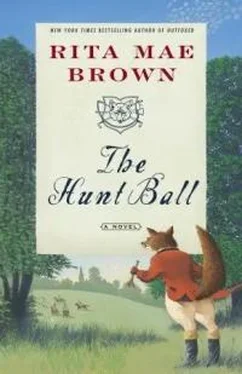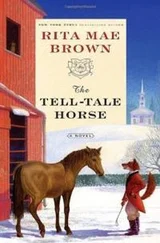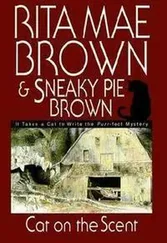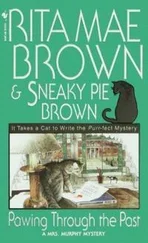The Custis Hall girls might be nervous, but it was not over Al Perez at this moment.
Before they knew it they flanked the cornfield, rumbled across the farm road, and blasted into the orchard grass field distinguished by the fir trees on one side to break the wind and southern hawthorns on the eastern perimeter, a gift from visiting birds. The owner of Mud Fence three generations back so admired the southern hawthorn, also called green hawthorn, with its bright red berries now in evidence, that he imported enough to line this forty-acre hayfield. In spring the trees delighted with showy white flowers.
“Bother,” Target grumbled to himself. He picked up an easy lope heading straight for home.
Three coops in a row marked off another farm road and a small pasture off that. Hit them right and they were a piece of cake, hit them wrong and you’d lurch over or worse, get stuck between them, the rest of the field balled up behind you trying not to cuss you out.
Sister cleared them all, noting that the footing, thanks to the dew still on the northern slope, proved slippery. Pine needles and leaves would be slippery, too, if they were still dewy.
Not much time to think about that because Target picked up the pace, now making a beeline for After All Farm. Within fifteen minutes they’d covered two miles of uneven terrain, jump after jump, and were now fording the lower branch of Broad Creek. Silt built up on the far bank and Rickyroo struggled to get through it.
Sister stopped. She called back to Tedi, in front. “Tedi, find another crossing. By the fourth horse this one will be impassable.”
“I’ll head up toward Tattenhall Station.” She mentioned an abandoned tiny white clapboard train station a half mile away. It once served a spur line for Norfolk and Southern. The railroad had built a serviceable bridge across the creek so employees could get to work. The railroad track ran parallel to the creek at that point.
“I’ll stay with the hounds,” Sister called back as Tedi touched her cap with her crop. They’d have a hell of a gallop to catch up but what a way to spend the morning.
As the sound of hoofbeats disappeared, Sister squeezed Rickyroo. Shaker, in sight, was flying flat out across a millet field, another coop, and into second-growth woods.
With his Thoroughbred speed and great heart, the young horse was soon within fifty yards of the huntsman.
The winding trail through the woods opened onto another hayfield, unfenced. They thundered across the green expanse, the hounds before them, then crossed a thin ribbon of a creek, over a log jump and into a peach orchard.
Sister assumed she’d not see the field again, but by the time they reached the old metal windmill put up in the 1930s, still turning, she could see Tedi, riding hard toward the sound of the horn and the hounds.
“She’s good,” Sister thought to herself and then laughed, since Tedi, at seventy-one, like Sister, could have ridden most anyone into the ground.
Target, wishing he hadn’t stuffed himself full of corn, hit top speed, twenty-five miles an hour. He knew this pack and somehow they’d managed to stick to his scent despite conditions. Five more minutes and his odor would have risen over their heads. He knew how fast the American hound can be. Still, he stayed straight as an arrow until he turned to see Dragon and Cora perhaps one hundred yards behind. He turned hard right in midair, ducked down low, and shot for the state road. The asphalt would help him since the tar smell would kill his scent. It was an old two-lane highway and he reached it—no cars as it was in the back of the beyond, so he tiptoed across it—then blasted into the pine plantation.
Dragon and Cora were flying so fast they overshot the line. Diana, a bit more deliberate, turned hard right.
Before she could open her mouth, Trinity, a third-year hound, a brilliant child, bellowed, “To the right.”
Dragon whirled almost as gracefully as Target to rejoin the pack. Cora breathed on his heels. Cora hated any hound getting in front of her. She was jealous of her position to the degree that Dragon was arrogant and wanted it for himself. The two would never get along.
The Custis Hall girls hung tight. Tootie had never been on a run this fast. The thrill of it diminished the hazards. Valentina, too, proved tight in the tack. Felicity, even though Parson was good as gold, experienced butterflies at some of the stouter jumps. Pamela Rene, not to be outshone by Tootie or Valentina, didn’t bat an eye. She rode right up, for the girls had begun to pass some of the field members whose horses were slowing in the heat.
The etiquette was that the girls should ride in the rear, but once a run unfolded the rule became whoever could keep up should. So if a younger member passed an older member or if a person without their colors passed someone with their colors (even though this was cubbing, everyone knew who had colors and who did not), it was acceptable. Yes, it irritated, sometimes, those who were passed, but at this level, with this distance being covered at warp speed, whoever had the best horses moved to the front. The Custis Hall girls, thanks to the wealth of their families, rode top-flight horses. Nothing instills confidence like a great horse. Nothing shakes one’s nerves like a second-rate one.
Sister felt the sweat roll between her breasts. The back of her shirt stuck to her. Her mouth felt parched. Thank God, she’d clipped her horses. She pitied any animal today with the beginning of its winter coat. Surely its rider would have brains enough to pull up and spare the horse.
The hounds, too, felt the heat, but their drive was so great, later on they’d fling themselves into a creek or even a water bucket—but only after they’d accounted for Target.
The heat affected the big red, too. He began to sink with one mile to go. He zigged, he zagged. Finally he noticed a large tree that had been uprooted in a windstorm. He nimbly leapt up, ran all the way up, then dropped fifteen feet below.
The hounds threw up, or lost the scent, for a moment at the huge old sycamore. Sycamores grow in moisture, often by creeks or river branches. This one had been uprooted thirty yards from Broad Creek so Target plunged straight down into the creek, swimming up toward After All Farm. The water felt good.
Gingerly, Ardent, an older hound, tried and true, sniffed the tree trunk. “He went up the trunk.”
Most of the Jefferson hounds, fast but sixty to seventy pounds, were too big to attempt to follow the line. Little Diddy, the runt of the whole pack, only in her second year, surprised everyone by hopping onto the trunk, pieces of bark flaking off, exposing the lighter color underneath. Carefully she picked her way up, the angle at thirty degrees.
“He made it to here,” she called down, the branches obscuring her, for she’d gone up quite far.
“Thanks.” Diana and Trudy walked under the end of the tree, jumped in the creek, swimming to the other side. The others followed, noses to the ground, once on land.
“Here!” Trudy called, the other hounds flocking to her.
They spoke at once, then came up against a bend in the creek. Trinity jumped in and swam straight across but he found no scent there.
“Work both sides of the bank,” Diana ordered. “He’s heading back to his den so he went north.” She figured he crisscrossed the creek again at the bend to throw them off.
It took four minutes of intense searching but finally Doughboy came up with the line, very good work for a second-year hound.
They opened. Shaker blew them on.
Target reached the spot where Snake Creek feeds into the larger, fast-moving Broad Creek, he turned left, staying on the left side of Snake Creek; He was now on After All Farm.
Читать дальше












